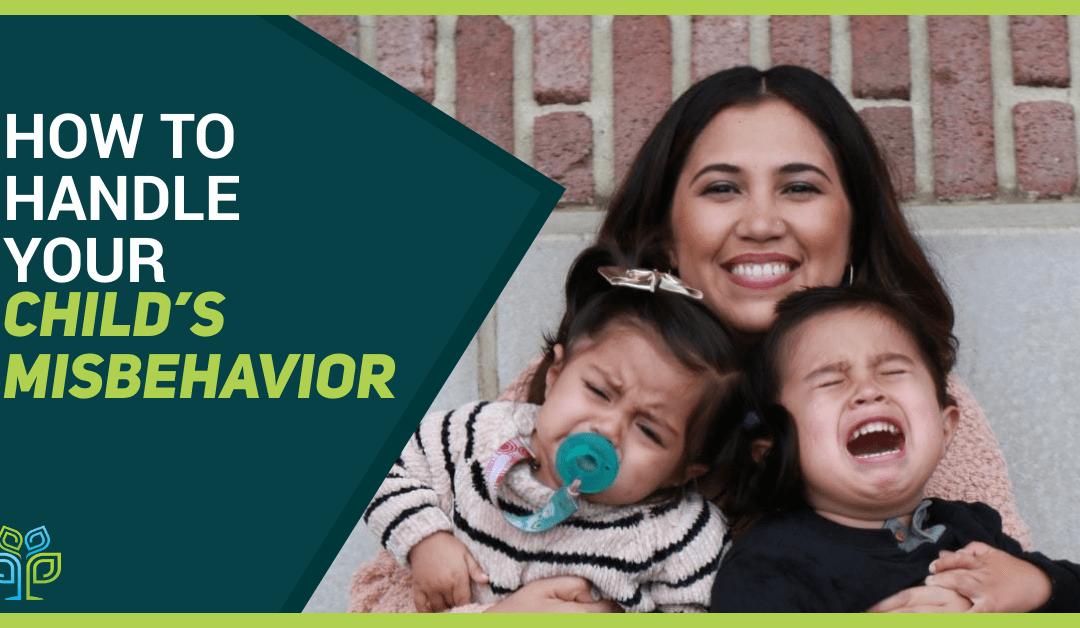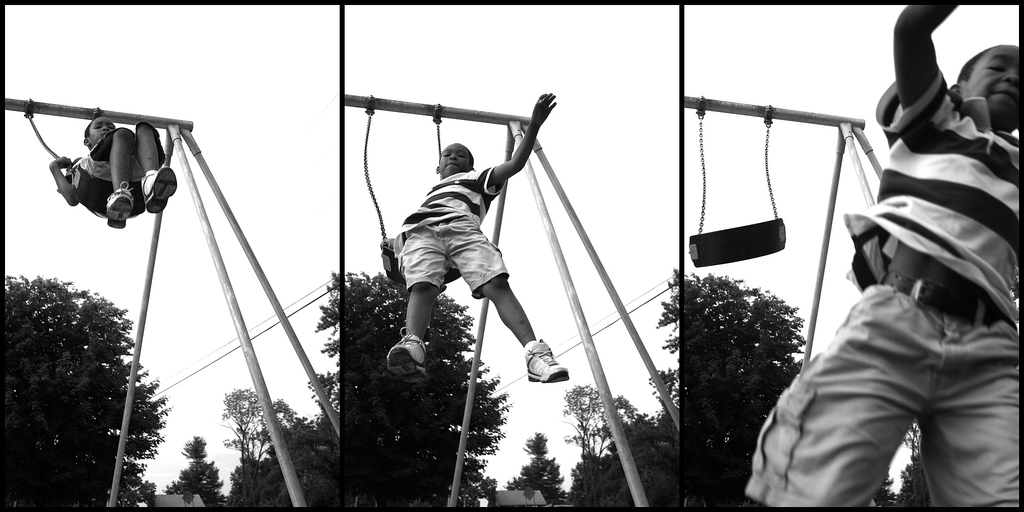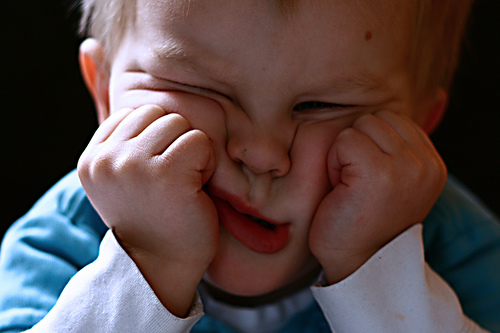When our first child was born, I went to visit a friend who is a mom of 11 kids. My friend gazed down at our cute little redheaded baby and said something about how nice that age is, before your kids can do things you don’t want them to do.
At the time, I naively thought kids “doing things I didn’t want” was something we wouldn’t have to deal with until the teen years.
What was I thinking?
I should have considered all the things that even just a one- or two-year-old child is capable of… hitting or kicking, saying “no” to everything, walking or running away from their parent, ad nauseam. (And older kids can do even more!)
Whether it’s your toddler having a meltdown in the aisle of the grocery store…
Or your child hits another child that they just met at the park…
Or your child says “no” when you ask them to take a bath…
Or your tween plays video games instead of doing their homework…
Or your teen stays on their phone way too late at night and then won’t get up in the morning.
For a lot of us parents, our child’s behavior is challenging. You might feel worried, overwhelmed, annoyed, angry, sad, hopeless, blame yourself, or even think that you’re a bad mom.
We’d like to offer you a new way to look at your child’s behavior.
On the blog, we’re listing 5 questions you can use when your child has “hard to manage” behavior.
Regardless of whether your child is a toddler or a teen, these questions are illuminating.
Illuminating = might cause mind-blowing, perspective-shifting, more connection and understanding, and insight into your relationship with your child.
When your child is doing something that you don’t like, these are questions you can ask yourself:
1. What is your child doing?
What can you actually observe? Hint: You can’t see a “not”. You can’t see a child not doing their homework. But you can see a child playing a video game.
2. What do you imagine your child is feeling?
Guesses are okay. Try to go deeper than happy, sad, or mad. What about disappointed, frustrated, fearful, hopefulness, annoyed, confused, hungry, tired, or worried?
Dr. Dan Siegel wrote that an important part of parenting is not just responding to our child’s behavior but also seeing and responding to their inner thoughts and feelings.
3. What need is your child attempting to meet by behaving that way?
Human needs are universal, although we each personally value some needs more than others. Hint: some common needs are: autonomy, connection, fun and recreation, belonging, being understood, communication.
4. When you see your child behaving that way, what are YOUR feelings?
Some options: Irritated, disappointed, grief, annoyed, sad, confused, worried, fearful, overwhelmed, exhausted, anxious, lonely, hungry, or tired.
5. What needs of yours are not being met when your child behaves this way?
Hint: Some common needs are safety, security, predictability, respect, order, peace, harmony, connection, being understood, etc
Leave your answers in the comments section we will use our favorites as an example in Part 2 to this post (and you’ll get some of our best coaching for your specific situation).
If, after reading the blog today, you’re interested in stuff like this WITH me… here’s how you join the Village.
You and I can personally talk in there if you’re struggling to figure out how to talk to your child.










1- my 3.5yo is hitting or screams to his 9mo baby bother. He straps any toy from baby and says everything is yours. He acts aggressively towards me and baby.
2- he is struggling with sharing his mom and his life with the new baby, from him is a big change and he feels frustrated because when baby cries I need to attend the baby (and baby crying is sometimes unpredictable).
3- he wants more attention, he was the only one and now he doesn’t have all the attention as before
4- I feel frustrated because I give both of my kids all the attention but I have only two arms, I can’t do more, I do one-to-one time with my eldest but in any case it doesn’t seem to be enough. I’m super tired because of baby poor sleep and I get very angry when my eldest hits me or hurts his bother
5- I need a bit of calm and both of them to be together peacefully (so that I can go to the toilet). It is very tiring to try to stop my eldest from hurting baby all the time. It is also impossible for the baby to sleep because my eldest screams. It is exhausting and I can’t do this anymore. I’m thinking of daycare for both to meet my basic needs (eating in peace, sleeping, having some time alone).
Any help or advice how to handle this?
Many thanks 🙏
My 4 year old us kissing and smothering his little sister all the time. She is only 3 months and gets easily uoset by all the affection.
What is he doing? Kissing her even when he sees she gets irritated. I believe he feels love and also autonomy, maybe connection. I feel exhausted and annoyed because I have to calm her down AGAIN… My need of calm and peace..and my kids getting along is not met. I do know that this sounds like an almost “silky” problem..siblings fighting and really hurting eachother is far worse, but this situation always creates tension and anger in our household… we tried letting them bw, but he pushes her to the limit and always gets her to cry…when we intervene..it raises anger and frustration in him… Oh JOY!
What is my child doing? Boy almost 6 years old. He is displaying very challenging and defiant behaviour. If we tell him not to touch something because it might get damaged he will do it, not to hit someone because it say something inappropriate, he will say it because it seems fun to him to do so. It’s like a game.
What is he feeling and what need is he seeking? He is seeking connection and trying to be playful in a non playful situation. He is also seeking to ascertain authority over others.
What am I feeling? Frustration and desperation sometimes as I know he understands when we explain some things can be rude and can’t be done especially with guests around but he will do it anyway out of playfulness. I feel like I need to negotiate all the time with him and in a way he often gets his way because he got something out of it. Feeling tired especially when other people are around and judging him and me and my partner react to such behaviors.
What needs of mine are not being met? Need of order and politeness, need of self discipline rather than authority.
Thanks for sharing this situation. I’ll see if I can talk about it in a future blog post.
This sounds familiar to me so I’d love to see a future blog post about this too!
Thanks, Erin. Here it is https://www.happilyfamily.com/how-to-soothe-two-little-kids-at-the-same-time/
Thanks Cecilia!
My 10-yo daughter avoids cleaning up her toys. There are usually a lot of them in an already cluttered space. No methods of organization have helped so far. She appears to be ignoring me. Rolls her eyes if I ask her to clean up/put away more than once. She says she wants to play with the toys this same way later or tomorrow, so cleaning them up would mean she’d have to start over again. She has a wonderful imagination and she’s super creative. I think she enjoys what she’s doing so much she doesn’t want it to end. I struggle with cluttered spaces, they make me feel disorganized inside and unable to move on to other things. I can’t sit down, there’s too much stuff everywhere. I need a clear space.
Thank you, Irene. What do you think she’s feeling in that situation? What are you feeling? I’ll see if I can address this in a future blog post.
What is child doing? Teen (15) staying up all night and sleeping all day (summer hours). Rebels against routine. Says I’m trying to control her if I set a bedtime.
What do I imagine she is feeling? Perhaps depressed or perhaps is not acknowledging feelings/feels dead inside.
What need is she attempting to meet? Hard to say. It’s more that it’s become a habit. It’s her form of autonomy and also claims to suffer from insomnia, which can happen when the sleep cycle is disrupted (but she doesn’t want to hear me say that)
What are my feelings? Frustrated, anxious, disappointed, hopeless, helpless, sad.
What needs of mine are not being met? Connection, satisfaction, concern for my child’s well-being
You are so right!
Sometimes we confuse “needs” with “wants (and even not convenient and no-voluntary wants). Kids are being pulled by mind-habits and they need help to change. We as adults have more experience in seeing how something they want can transform in a bad habit that with literaly sick their mind, body. Bad influences (pseudo friends) and screen time are the wolves in sheeps clothes nowadays).
Connection is key to preserve our duty and service to them as their guides and guardians. Authority means to help create/grow (author). It is our promise to them. Better sooner than later to regain connection and change their environment so the bad habits can be eamore asily change with good ones. hugs!
As I see it, the challenge, Esmeralda, is how to maintain the connection with our kids while also keeping them safe. How do we meet our needs and our kids needs at the same time? The next blog post shows how!
This is great, Linda! I’m using it as an example for the next blog post!